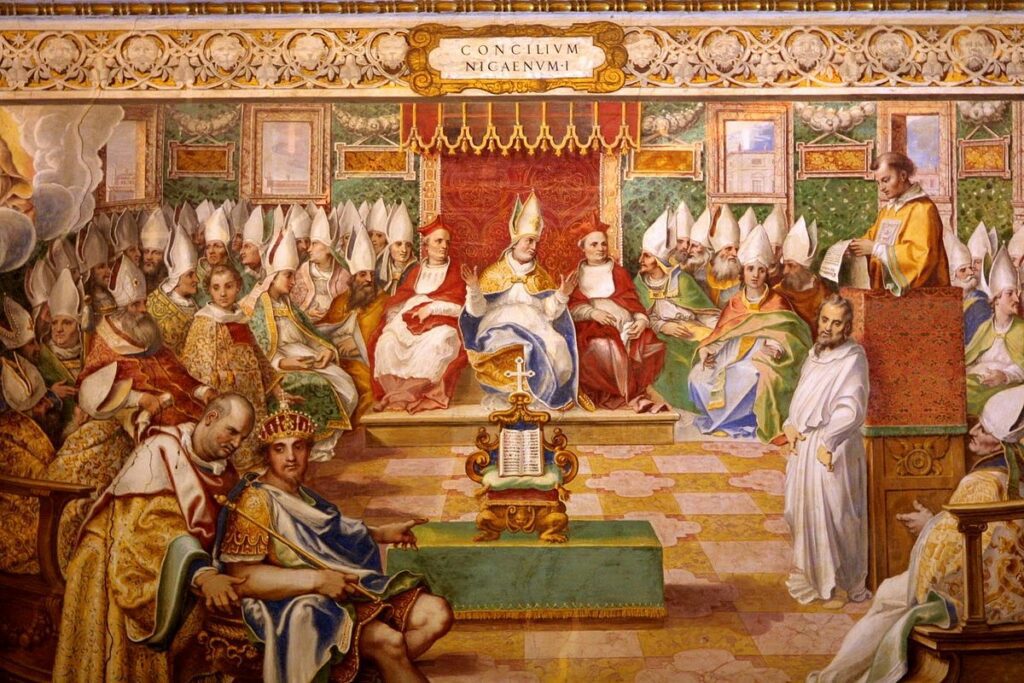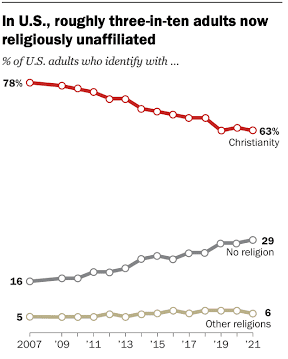“Whoever does not love does not know God, because God is love.”
1 John, chapter 4:8
Note: Biblical scripture is from the New Revised Standard Version (NRSV) edition.
Introduction to Christianity

The Christian religion has impacted a significant portion of humanity for well over fifteen hundred years. The majority of Christians are Christians because of their parents’ influence. Christian dogma is unquestioned by most Christians due to their parents’ influence and because the dogma has been so prevalent in our culture—so many people believe it’s true, so it must be true. However, much of it is just not true. Churches have long ignored the truth that God’s Spirit dwells within every one of us, despite clear statements in the gospels affirming our divine nature.
“Once Jesus was asked by the Pharisees when the kingdom of God was coming, and he answered, “The kingdom of God is not coming with things that can be observed; nor will they say, ‘Look, here it is!’ or ‘There it is!’ For, in fact, the kingdom of God is within you.”
—Luke 17:20-21
“Do you not know that you are God’s temple and that God’s Spirit dwells in you?”
—1 Corinthians 3:16
We wish to reiterate this biblical truth: God—love and divine consciousness—resides within you; heaven resides within you. Deep truths can be found in the Bible. The two verses above are good examples of this: God is divine consciousness and love; God resides within you; heaven resides within you. When Christians realize that God lives within them they may no longer need the Church.
We intend to attest to followers of Jesus of Nazareth that the scripture of his teaching of love and forgiveness is indeed true. However, some sayings attributed to him are false. The Church hierarchy invented certain scriptures to create a religion that could control its followers. It is helpful for Christians to understand that none of the Gospel writers personally knew Jesus. These works were written well after he died.
In a later chapter, for those wanting to know the truth, we will introduce a collection of Jesus’ teachings available without the distortion of false dogma. In this introduction, we offer an overview of our perspectives on Christianity and its dogmas:
- Christianity’s Rewarding Aspects
- The Discerning Christian
- Christianity’s False Dogmas
- Creating a Religion by Making Jesus God
- Christianity’s Decline
- Ten Commandments: A Religious Code, Not a Moral Code
- Conclusion
Christianity’s Rewarding Aspects

Committed Christians find that their lives are enriched when their focus is on love rather than sin and eternal damnation. While in church, many Christians experience true spirituality and a sense of being connected to something greater than themselves. Furthermore, Christianity also provides some useful moral guidelines and social support. Community is a vital aspect of many Christians’ lives, and many denominations help the poor, providing Christians with the opportunity to open their hearts and experience the joy of giving.
The Discerning Christian
One of the most damaging and dangerous deceptions endorsed by the church is the proposition that you can’t trust your own intellect and Heart to know the truth. (Heart is capitalized to connote a person’s innate love-based wisdom.) When your mind is closed from having been programmed with falsehoods, discovering the truth is extremely difficult. But when your mind is open and discerning, you will discover the truth for yourself, and your Heart will guide your inquiry. You are the master of your destiny. Is your belief system preventing you from living a life of lasting peace and happiness? When someone thinks they know what is best for you, tap into your inner wisdom. Do they truly know?
Accept only those religious beliefs that take you to love. If your religious beliefs are causing you to be judgmental and unloving to anyone at all, it would be wise to question those beliefs. Judgment, anger, and hatred drain your energy and make you and others unhappy. They deny the love of Jesus.
When your discernment about your religious beliefs takes you to love, your Heart will let you know you are on the right track. If you are a Christian, your love of Jesus is likely the most fulfilling aspect of being a Christian. You are undoubtedly familiar with his words, “Love your neighbor as yourself” and “Do unto others as you would have them do unto you.” These are such simple yet powerful truths and guidelines. If everyone embraced them, we could change the world.
Besides love, Jesus’ other central teaching is forgiveness: forgiving others and also forgiving yourself. When you forgive yourself and others, you release the negative energy you are holding. No longer will you be stuck in the pain of the past. You will feel lighter and more peaceful.
Knowledge is power; knowing the truth will set you free. When you use your God-given intelligence to realize the truth that any Christian teaching that is not loving is false. This truth will free you to see yourself as you truly are: at your core, you are pure, unconditional love, and you are capable of living as love in your human life. This truth will free you to have a direct, personal relationship with God without the need for an intermediary. You will discover that God speaks to you through your own Heart.
Christianity's False Dogma

The Catholic theologians, bishops, and popes of the early Church created a religion that enabled them to amass vast power and wealth, but this religion is not based on the teachings of Jesus. People created it, and much of the dogma is indeed false. The major falsehoods are the exclusive attribution of godhood to Jesus—supported by erroneous claims of his physical resurrection and virgin birth; the inherent sinfulness of humanity (original sin); and heaven versus hell and the need for intervention by clergy to save peoples’ souls and allow them to avoid hell and get into heaven.
Christianity is a patriarchal religion. Women have certainly played a role within Christianity throughout the ages. Men wrote the stories, created the theology, and built the power structure that evolved into Christianity and has fueled its growth from its early days. All of Christianity’s ideas, concepts, and beliefs were created by men over more than 2,500 years, up to the present day. Their motivations ranged from wanting to understand the nature of reality, to wanting to serve mankind, to wanting to control people and amass power and wealth. Their values ranged from love and compassion to power, greed, and hatred.
Creating a Religion by Making Jesus God

A widely-held belief among many of Jesus’ followers in the years following his death was that he was a god. This belief is not as unusual as it sounds. According to Bart Ehrman in his New York Times bestselling book, How Jesus Became God, “…numerous people in antiquity, among both pagans and Jews, were thought to be both human and divine.” As an example, the Roman emperors were considered gods before, during, and for hundreds of years after the life of Jesus.
Many of the followers of Jesus began thinking that he was divine after he appeared to people after his death as an apparition (as opposed to a physical body). Some of these people believed that he had resurrected his physical body, although this was not the case. Apparitions are not uncommon. Raymond Moody, Ph.D., coined the term “near-death-experience.” Moody’s book, Reunions: Visionary Encounters with Departed Loved Ones states that “Studies suggest that as many as 66% of widows experience apparitions of their departed husbands.” In another study, Erlendur Haraldsson, Ph.D., author of The Departed Among the Living: An Investigative Study of Afterlife Encounters, completed extensive research of Europeans who confirmed that they had a personal experience with the deceased in a waking state, and 67% of them said they had visual sightings.
The story of the virgin birth of Jesus appears in the Gospels of Matthew and Luke, but since no one knows who wrote these gospels, it is impossible to determine who made up this story. We explain this in Unveiling Christianity: New Testament chapter. According to Andrew J. Welburn, in his book From a Virgin Womb: The Apocalypse of Adam and the Virgin Birth,
“Plausible sources that tell of the virgin birth in areas convincingly close to the gospels’ own probable origins have proven extremely hard to demonstrate.”
The only logical explanation is that it was fabricated by the bishops of the Catholic Church, with ultimate authority residing with the bishop of Rome.
Over time, the early Church embraced the fiction of original sin. This fiction was invented hundreds of years after Jesus died by a Catholic bishop, Augustine of Hippo, North Africa. Augustine mistakenly believed that the Genesis allegory of the mythical “first man” Adam was historically true.

Adam was supposedly created by God in the Garden of Eden and disobeyed God by eating the forbidden fruit. Augustine considered Adam’s mythical disobedience to have been mankind’s “original sin.” Based on the belief that everyone on earth was descended from Adam, Augustine mistakenly concluded that we are all contaminated by Adam’s original sin through his “corrupted semen.” Therefore, everyone ever born has inherited original sin—a tainted nature and a proclivity to sin—and, thus, is in need of saving.
Augustine’s belief in original sin created a dilemma: The fact that he was born would have made Jesus defective. If Jesus was born of Adam’s “corrupted semen,” how could he save anyone from the original sin?
This quandary was resolved by the lie of the virgin birth. The Church’s teaching that Jesus’ mother, Mary, was impregnated by the Holy Spirit—without sexual intercourse—meant that Jesus was uncontaminated and, therefore, was able to save humanity from its purported original sin.
Perpetration of the lies of the virgin birth and the resurrection of Jesus’ physical body was instrumental in labeling him God.

For some years following his death, Jesus became known as the “Son of God.” However, for hundreds of years after his death, the issue of whether he was God was a hotly contested topic of debate. This debate created intense conflict among early Catholic bishops in the Roman Empire. The bishops also argued if Jesus was God, then in what capacity?
Three centuries after Jesus’ death, the Roman Emperor Constantine made Christianity the “favored” religion of his Empire. The emperor attempted to unite the quarreling bishops by resolving the issue of Jesus’ godhood. He saw this as an important step in shoring up his fragmenting empire.

He invited about 1,800 Catholic bishops from throughout his empire to attend the First Council of Nicea, held in 325. Approximately 300 bishops showed up. After much debate and arm-twisting by Constantine, they declared that Jesus is the Son of God, coeternal with the Father, and begotten from the same substance. In their month-long session, the Catholic bishops also produced twenty additional dogmas.
The official deification of Jesus made him special, which resulted in the Church being perceived as special. This fortified people’s loyalty to the Church and established it as being superior to other religions.
The Illusions of Heaven and Hell

Christian churches have convinced their followers that heaven is a place outside of themselves where they can go when they die. To get there, they must obey church rules in the form of doctrine (which means directly or indirectly supporting the church financially). This is a travesty. Heaven is not a place you go to after you die, but our natural state of consciousness, which we can access by going within.
The fearsome alternative to heaven is eternal damnation and burning in hell, an alternative perceived as real by 58% of U.S. adults according to a 2014 Pew Research Center report: Belief in Hell.
Christian denominations tend to ignore the fact that Jesus taught that the kingdom of God is within you. Instead, they focus on heaven and hell as literal places you go after death, something that Jesus never taught. New York Times bestselling author Bart Ehrman, in his book Heaven and Hell, states:
“The ideas of a glorious hereafter for some souls and torment for others, to come at the point of death, cannot be found either in the Old Testament or in the teachings of the historical Jesus. To put it succinctly: [Jesus] did not believe that the soul of a person who died would go to heaven or hell…He says nothing here about eternal fires.”
The Most Harmful False Dogmas
Perhaps the two most harmful false dogmas of Christianity are original sin and hell:
Original sin: Most Christians have been taught that they are born contaminated with original sin. But there is absolutely no validity to the notion of original sin. All souls are innocent, and they remain so regardless of negative thoughts or harmful actions during their lives on earth.
Hell: Most Christians have been taught that sinners burn in hell for eternity after they die. As with original sin, there is no reliable evidence that exists to support the concept of hell. (We go into detail about this in the Heaven and Hell chapter.) In truth, there is no realm in the afterlife where souls burn for eternity. Souls are sovereign with the freedom to experience. According to the exhaustive number of reports on non-physical dimensional realms, souls never get stuck nor confined anywhere for eternity. Ultimately all souls return to the Source.
Effects of Harmful Dogma
Churches that claim to be “the one true church” or that Christianity is “the one true religion,” or that people can “only be saved through Jesus” are using fabrications to control people. These fabrications inculcate fear—the fear of going to hell and not getting into heaven, which churches use to attract people to their church and keep them from leaving. These fabrications serve religious authorities well, but they can cause immeasurable suffering in the form of fear, guilt, and shame for any of their followers who deviate from church doctrine.
Religion, a presumed authority on spiritual matters, is misleading people and too often creates more hatred and conflict in the world, not more love.
Churches teach some truth along with substantial untruths; this is a particularly dangerous combination, for falsehoods are more readily believed when intermingled with truths.
Regrettably, even though Christian churches teach about brotherly love, Christians are often judgmental toward people who don’t share their beliefs or are simply different. Such Christians often overlook or make excuses for the hypocritical nature of their judgments. As a result, Christianity has been corrupted, and the churches don’t seem to recognize this hypocrisy or try to correct it. Instead, churches tend to activate a sense of superiority and self-righteousness within their followers that too frequently leads them into conflict with those who disagree with them.
Such harmful effects often seem to occur in denominations that teach followers to fear a wrathful, punishing God. Many individuals who have been harmed have been involved with highly dogmatic, authoritarian, and controlling religious groups.
Christianity’s Decline
Christianity in America is in a state of turbulence. A major segment of the population is leaving Christianity to find spiritual fulfillment elsewhere. In a 2021 survey by the Pew Research Center, 63% of all American adults self-identified as Christian; this represents a substantial drop from 85% in 1990. The trend of Christians leaving the Church appears to be accelerating. Their share of the U.S. population has declined 12 percentage points in the last ten years. The following graph is for the years 2007 to 2021.

Much of the dwindling Christian population is attributable to the younger generations leaving the church or rarely going at all. This Pew report shows that 29% of Americans now say they are religiously unaffiliated. This group is more highly educated than the general public, according to Pew.
False Dogma Is Leading to Christianity's Decline

According to a 2016 study by the Public Policy Research Institute, the most important reason why people have left their childhood religion is that they stopped believing in their religion’s teachings. It is apparent that Christianity’s model of capitalizing on the powerful human emotions of hope and fear with the false promise of an eternity in heaven or hell is losing its power to control people.
Clergy Members Have Been Misled
Innocent people have been programmed and manipulated. Some of these people have become pastors, ministers, and priests because of a desire to help people get into heaven and stay out of hell. They didn’t realize that the Christian version of a literal heaven and hell after death doesn’t exist. Already, some of them have left their churches because they saw through the lies and perhaps realized the harm being done to their congregations and themselves. Some former clergy have joined The Clergy Project, while some of their followers have joined Recovering from Religion.
Ten Commandments: A Religious Code, Not a Moral Code

The Bible contains two complete sets of the Ten Commandments: Exodus 20 and Deuteronomy 5. Some of the Ten Commandments (Exodus 20:2-17) are an Israelite religious code, not a moral code. There is a crucial difference: a moral code is a set of principles that support us in analyzing and reaching moral solutions in the face of life’s dilemmas; a religious code is a set of rules given by divine authority, and its “morality” is the act of obedience to that authority—obey or pay the consequences. The last seven commandments (Exodus 20:12-17) could qualify as nonreligious moral codes: Thou shall honor your parents, and not murder, commit adultery, steal, bear false witness, nor covet your neighbor’s wife or anything that belongs to your neighbor.
Christians are not taught that the words spoken by God in the Ten Commandments were actually written by Jewish priests and scribes over 2,500 years ago.

This is unfortunate given that reading the first three commandments (in Exodus 20:2-11) reveals that God (Yahweh) proclaims that he is “jealous, that you are to have no other gods before him,” that he punishes the children for the “iniquity of parents to the 3rd and 4th generation of those who reject me…,” and that he will not absolve anyone who misuses his name, and that the seventh day [Saturday] is a sabbath to the Lord your God, on which you must do no work. We trust that most Christians don’t follow these commandments to the letter, and by not doing so, demonstrate that their morality is independent of religion.
The early Christian leaders reinterpreted the third commandment when they proclaimed the day of rest to be changed to Sunday. How did these Christian leaders see fit to disobey God by establishing Sunday, and not Saturday, as the day of rest? Have they caused their followers to sin?
How many Christians can recite from memory the Ten Commandments? They claim that they follow them and are, therefore, “good Christians.” Yet, if nothing else, they break the third commandment by not honoring the Hebrew Sabbath, Saturday, and by working on that day.
Furthermore, all but the most judgmental Christians are likely to flinch from the first commandment, “…I the LORD your God …am a jealous God, punishing children for the iniquity of parents, to the third and the fourth generation of those who reject me….” Would a loving and just God punish you for unjust acts that your parents, grandparents, or great-grandparents may have committed?
Ultimately, it is important for Christians to realize that the Old Testament including the Ten Commandments predates the fundamental teaching of Jesus. There are actually 613 commandments supposedly set down by God in the Old Testament, some of which command people to kill and start wars in the name of God. Unlike these Old Testament teachings, Jesus taught us to love. His teaching of love takes precedence over all teachings in the Hebrew Bible that aren’t about love. Love is paramount.
Conclusion

Historically, Christian leaders have subverted for their own purposes Jesus’ teachings of love, forgiveness, and brotherhood beneath an array of false dogmas that have enabled churches to control their members. But in recent decades, an increasing number of people have rejected the false dogmas and left their churches. Many of these people are engaging in spiritual endeavors that more closely align with Jesus’ teachings.


